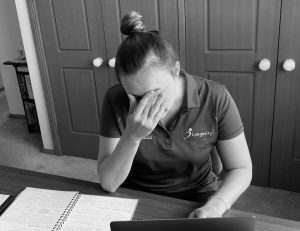Work burnout in the current society… How can exercise help?
Do you feel exhausted?
Feel like all your energy is depleted?
Feel you are not as efficient in your work?
Or feel negative towards your job?
These are classic signs of work burnout which is increasing in society today (Ochentel et al., 2018).
Today, Longevity Exercise Physiology Drummoyne, Edgecliff, Marrickville, Bella Vista, Randwick, Pymble, Balmain, Neutral Bay and Coburg, Melbourne, discuss the effects of work burnout and how exercise can help us to manage and prevent this from occurring.
What is Work Burnout?
Work burnout is characterised by physical and mental exhaustion resulting from chronic work stress not successfully managed (Woo et al., 2020; World Health Organisation, 2019). This places an individual at a higher risk of developing a mental health condition, chronic illness or sickness such as the flu, depression and cardiovascular disease resulting in poor health and quality of life (Ochentel et al., 2018).
Moreover, high levels of stress increase a stress hormone called cortisol in the body which can lead to insulin resistance and promote inflammation around the body. Inflammation is linked with chronic diseases such as obesity, diabetes and depression (Migliaccio, 2018).
“It can also affect your profession, causing poor decision making, work quality, communication, and an increased number of mistakes.”
This can relay negative effects on your work, but also the wider workplace (Migliaccio, 2018). Consequently, work burnout poses a serious problem in today’s society which is extremely important to recognise and address rather than persevering through it.
What Can You Do?
Exercise is an effective treatment to help combat work burnout. But how?
Exercise is known to improve mood, reduce depression and anxiety. For example, studies have found those who are more fit experience a greater decrease in anxiety. Exercise has exceptional benefits on mental and psychological health including enhanced self-efficacy, self-esteem and wellbeing as well as feelings of control and competency (Karr, 2019; Parry et al., 2018).
Additionally, exercise has benefits on ensuring a longer and better quality of sleep. It also helps you fall asleep quicker (Karr, 2019). This has important implications as sleep assists in the restoration of cognitive resources like control, motivation and concentration. These are used throughout the day and therefore, positively improves both present and future work performance (Henderson & Horan, 2021).
“Regular exercise can serve as a treatment to improve fatigue, stress levels, mental health and work performance. It can decrease the risk of burnout and enhances work quality and outcomes.”
This is why it’s so important to set up a schedule of regular exercise where you can escape mentally from work and focus on improving your work performance, but more importantly your health and wellbeing.
The Exercise Physiologists at Longevity are here to help you implement a regular routine and start meeting your exercise goals.
Call Longevity Exercise PhysiologyDrummoyne, Edgecliff, Marrickville, Bella Vista, Randwick, Pymble, Balmain, Neutral Bay and Coburg, Melbourne on 1300 964 002 to book in a session today!
Written by Courtney Maher and Romina Vigorito (Sydney University Student)
References
Henderson, A.A., & Horan, K.A. (2021). A meta-analysis of sleep and work performance: An examination of moderators and mediators. Journal of Organizational Behaviour,42(1), 1-19. 10.1002/job.2486
Melnikow, J., Padovani, A., & Miller, M. (2022). Frontline physician burnout during the COVID-19 pandemic: national survey findings. Journal of BMC Health Services Research, 22, 365. https://doi.org/10.1186/s12913-022-07728-6
Migliaccio, D. (2018). Killing Burnout with Exercise and Nutrition. Young Physicans, 26-27 . .
Ochentel, O., Humphrey, C., & Pfeifer, K. (2018). Efficacy of Exercise Therapy in Persons with Burnout. A Systematic Review and Meta-Analysis. Journal of Sports Science and Medicine, 17(3), 475-484. .
Parry, D.A., Oeppen, R.S., Amin, M.S.A., & Brennan, P.A. (2018). Could exercise improve mental health and cognitive skills for surgeons and other healthcare professionals?.
Woo, T., Ho, R., Tang, A., & Tam, W. (2020). Global prevalence of burnout symptoms among nurses: A systematic review and meta-analysis. Journal of Psychiatric Research, 123, 9-20. https://doi.org/10.1016/j.jpsychires.2019.12.015
World Health Organisation. (2019 May 28). Burn-out an “occupational phenomenon”: International Classification of Diseases. https://www.who.int/news/item/28-05-2019-burn-out-an-occupational-phenomenon-international-classification-of-diseases


